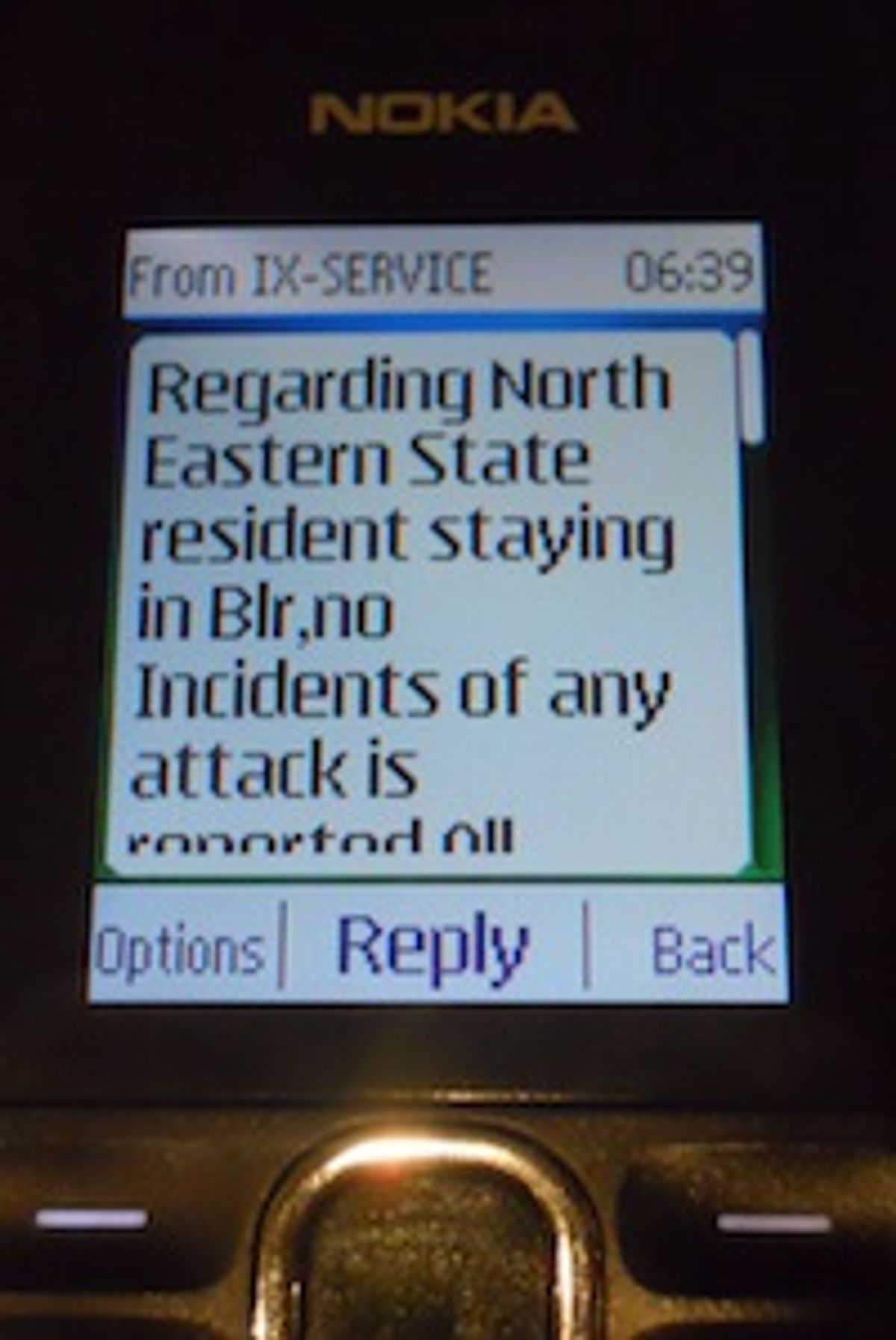For the last couple weeks, India has been in a state of internal flux.
In July, more than 75 people, mostly Muslim, were killed in ethnic violence in the northeastern state of Assam. In mid-August, rumors of reprisal attacks against people of northeastern origin living in other Indian cities began circulating through social networks and via text messages. Some multimedia messages and websites contained video footage purposely doctored to incite violence. In some cases, altered archival video was portrayed as contemporary footage from the northeast.
And so, thousands of people who hail from the country’s northeast—students, construction workers, restaurant employees—have fled southern cities like Chennai, Bangalore, and Pune to return home. Although there have been scattered incidents of intimidation and threats, much of the sudden internal migration has been based in fear of what might happen rather than actual events.
Mobile text messages and online social networks allowed these rumors and misrepresentations to spread with unprecedented speed and reach, catching the Indian government by surprise. More than half of Indian households have a mobile phone, more than have indoor toilets, according to the 2011 census. And text messages are affordable enough for even the least well off to send and receive occasionally.
Government officials have struggled to deal with these new social tools. On 16 August, they instructed mobile operators to ban bulk SMS messages and multimedia messages for 15 days. But by the time the order was in place, the migration was already well underway.
And the order itself immediately caused confusion. The term “bulk SMS” usually refers to paid advertisements or information sent out to thousands of mobile subscribers by businesses, not messages that individuals send to multiple contacts in their address book. But by limiting SMSes to 5 recipients, the order swept them up in its net. It even prevented many people from sending typical well-wishes for Eid-ul-Fitr, the Muslim holiday that marked the end of Ramadan on 20 August. (Today, the Ministry of Communication belatedly revised the limit to 20 recipients.)
As Anant Rangaswami points out in Firstpost India, this knee-jerk censorship has the unintended effect of giving rumor-mongers the power to shut down information networks. In addition, the ruling did nothing about what digital marketers call “organic” traffic—real people spreading what they believe are genuine messages to people they actually know, as long as it was fewer than 5 at a time.
This was not the first time a heavy hand had been laid on SMS. India also preemptively banned bulk messaging in September 2010, in advance of a controversial court ruling. If such action becomes routine, it will give controversial groups, both big and small, the ability to black out social communication whenever they please.
Rangaswami argues that the government should embrace these tools instead of shutting them down. The problem is that incendiary groups arguably have more to gain from viral networks than the government does. It’s hard to spot which rumors are likely gain critical momentum, and trying to correct every bit of digital misinformation on the Internet would be a waste of the public's time, effort, and money. While it's easy to agree, in principle, that a proactive government technology policy is more effective than a reactionary one, it's hard to imagine how exactly government SMS messages could have prevented this exodus.
But at least it can be better prepared. Government agencies could start by coming up with a plan to combat social rumors, so that they don't waste time deciding what to do while events are unfolding. By the time I received the reassuring text message pictured above, hundreds of residents had already fled Bangalore. Our networks now transmit information too quickly for real-time decision-making.
Censorship also has a larger cost to the society at large. For one thing, there's the slippery-slope argument: At the same time Indian censors were trying to quash violence inciting rumors, they also blocked six Twitter accounts for parodying and mocking the prime minister.
More importantly, however, while the government may have a legitimate responsibility to counter destructive false rumors, what if the rumors had a greater element of truth? If there had actually been a wave of ethnic attacks in southern cities, the restrictions on communication could have resulted in harm to people who might have been warned by family members and friends about the danger.
Joshua J. Romero is a software developer and journalist. A former IEEE Spectrum senior editor, he holds a bachelor’s degree in astronomy and physics from the University of Arizona and a master’s in journalism from New York University.



